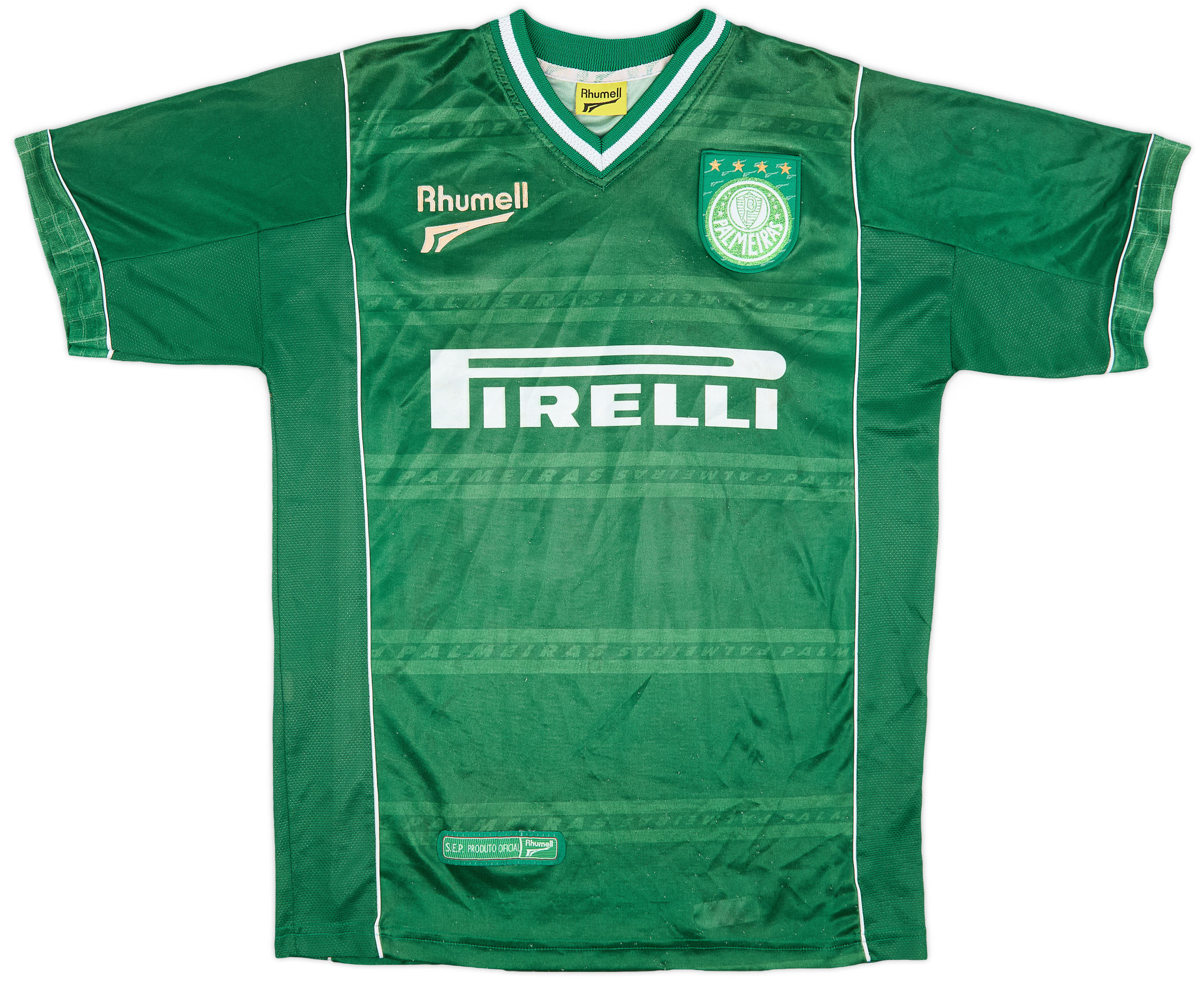Palmeiras
Introduction Palmeiras, officially known as Sociedade Esportiva Palmeiras, stands as one of the giants of Brazilian football and a proud representative of the country’s rich sporting culture. Founded in 1914 by members of the Italian community in São Paulo, the club has grown from its humble beginnings to become an integral part of Brazilian football […]
1999 Palmeiras Special Signed 'Copa Libertadores' Shirt #99 (L)
237.99£ - ca: €281
1993 Palmeiras Away L/S Shirt - 9/10 - (L)
237.99£ - ca: €281
1997 Palmeiras Third Shirt #10 - 8/10 - (L)
177.99£ - ca: €210
1998 Palmeiras Home Shirt #9 - 9/10 - (XL)
177.99£ - ca: €210
1996 Palmeiras 'Campeonato Paulista' Home Shirt #10 - 8/10 - (XL)
174.99£ - ca: €206
2001-02 Palmeiras Home Shirt #10 - 8/10 - (L)
148.99£ - ca: €176
2001-02 Palmeiras Home Shirt #10 - 7/10 - (L)
118.99£ - ca: €140
2017 Palmeiras Authentic Home Shirt (M)
118.99£ - ca: €140
2010 Palmeiras Home Shirt - 9/10 - (XL)
106.99£ - ca: €126
2011 Palmeiras Home Shirt - 9/10 - (XL)
106.99£ - ca: €126
2007 Palmeiras Home Shirt #7 - 8/10 - (L)
94.99£ - ca: €112
2003 Palmeiras Home Shirt - 5/10 - (L)
82.99£ - ca: €98
2009 Palmeiras Third Shirt - 8/10 - (S)
82.99£ - ca: €98
1999 Palmeiras Rhumell Training Shirt - 9/10 - (L)
82.99£ - ca: €98
2008 Palmeiras Away Shirt - 8/10 - (S)
82.99£ - ca: €98
2013 Palmeiras Home Shirt - 9/10 - (S)
82.99£ - ca: €98
2024 Palmeiras Home Shirt
79.99£ - ca: €94
1980s Penalty Template Shirt (Palmeiras) - 8/10 - (S)
58.99£ - ca: €70
2004 Palmeiras Home Shirt #7 - 5/10 - (L)
53.99£ - ca: €64
Introduction
Palmeiras, officially known as Sociedade Esportiva Palmeiras, stands as one of the giants of Brazilian football and a proud representative of the country’s rich sporting culture. Founded in 1914 by members of the Italian community in São Paulo, the club has grown from its humble beginnings to become an integral part of Brazilian football history. Known affectionately as “Verdão,” or “the Big Green,” Palmeiras boasts a passionate fanbase and a storied tradition that reflects the heart and soul of Brazil’s vibrant football culture.
Club History
Palmeiras was established on August 26, 1914, under the name Palestra Itália. The creation of the club was a response to the growing desire for a football club among the Italian immigrants of São Paulo. The name change to Sociedade Esportiva Palmeiras occurred in 1942 amidst World War II, as Brazil entered a campaign against the Axis powers. This shift not only marked a new chapter for the club but also symbolized a broader push for unity within Brazil’s diverse cultural landscape.
Throughout its history, Palmeiras has occasionally faced challenges, such as financial difficulties and internal disputes, particularly during the late 20th century. However, the club has consistently showcased resilience, overcoming obstacles to maintain its position as one of the premier football institutions in Brazil.
Achievements
Palmeiras’ trophy cabinet is one of the most impressive in football. The club has won numerous prestigious titles, both domestically and internationally. In the Brazilian Serie A, Palmeiras has claimed the championship title a remarkable ten times, with their most recent wins in 2016 and 2018. The club’s illustrious history in the Copa do Brasil is also noteworthy, securing the trophy four times as of 2023.
On the continental stage, Palmeiras made history by winning the Copa Libertadores, South America’s most coveted club trophy, three times (1999, 2020, and 2021). This achievement has cemented their status not only as a national powerhouse but also as a relevant player in South American football. The club’s success in these tournaments highlights its consistent performance and competitive spirit in various competitions over the decades.
Significant Players and Matches
Throughout its history, Palmeiras has been home to many legendary players who have left lasting legacies. Players like Ademir da Guia, commonly regarded as one of the greatest Brazilian midfielders, dazzled fans with his skillful play during the 1960s and 1970s. More recent legends, such as Marcos, the goalkeeper known for his astonishing performances during the 1999 Copa Libertadores final, have also etched their names into the club’s folklore.
One of the most significant matches in Palmeiras’ history is, undoubtedly, the 1999 Copa Libertadores final against Deportivo Cubs. After a hard-fought series filled with drama and intensity, Palmeiras emerged victorious, earning its first-ever continental title and a place in the hearts of football fans worldwide. Such landmark moments, highlight the club’s rise to prominence and its long-standing pursuit of excellence on the pitch.
Cultural Impact
Palmeiras is more than just a football club; it is a significant cultural force within Brazil. The club has a unique connection with its fans known as “palmeirenses,” who demonstrate unwavering loyalty and passion. The atmosphere during home matches at Allianz Parque – their modern stadium that opened in 2014 – showcases this vibrant energy, with fans continuing to create an electrifying experience.
Beyond the pitch, Palmeiras plays a pivotal role in the local community. The club organizes various social initiatives, engaging fans and local residents beyond football. These programs often focus on youth engagement and promoting sports as a pathway to personal development—ensuring Palmeiras’ influence extends well into the community’s social fabric.
Conclusion
In the vast landscape of Brazilian football, Palmeiras has carved out a unique identity that resonates with its supporters and rivals alike. With a rich history, numerous accolades, and a deep connection with its community, the club exemplifies the best of what football represents. As it continues to compete at the highest levels both in Brazil and abroad, Palmeiras remains a beacon of tradition, excellence, and passion in the world of sports. The club is not only a champion on the pitch but also a vital part of the cultural identity in Brazil, ensuring its legacy will endure for generations to come.



















